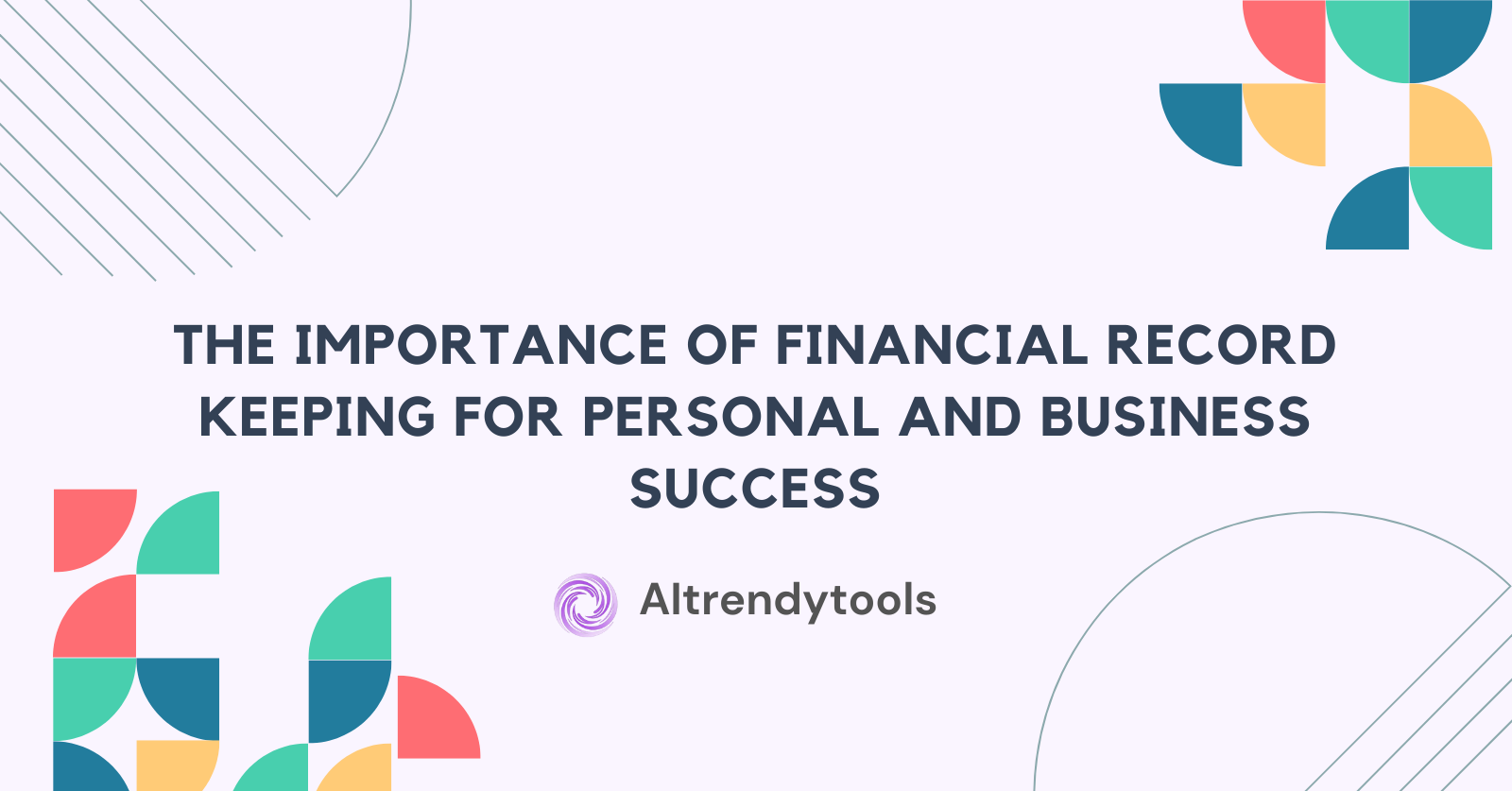🔥 AITrendytools: The Fastest-Growing AI Platform |
Write for usThe Importance of Financial Record Keeping for Personal and Business Success
Discover why financial record-keeping is crucial for success. Learn essential practices for organizing finances, making informed decisions, and ensuring tax compliance.
Aug 7, 2025
Financial record keeping is a fundamental practice that plays a pivotal role in ensuring long-term financial success, both for individuals and businesses. Whether you’re managing your personal finances or running a small business, maintaining accurate records is essential for tracking your financial health, making informed decisions, and staying compliant with tax regulations. In this article, we will explore the importance of financial record keeping, its benefits, and the best practices for keeping accurate and organized records.
Understanding Financial Record Keeping
At its core, financial record keeping refers to the process of systematically documenting and organizing financial transactions. This includes everything from income and expenses to assets and liabilities. By maintaining detailed records, individuals and businesses can track their financial activities over time, assess performance, and make adjustments when necessary.
For individuals, this could involve tracking personal income, savings, investments, and expenditures. For businesses, it includes documenting revenues, operational costs, payroll, tax obligations, and financial forecasts. Regardless of the scale, the goal is the same: to have a clear, accurate, and accessible record of financial activities that can be referred to when needed.
The Benefits of Financial Record Keeping
1. Better Financial Management
Effective financial record keeping allows both individuals and businesses to manage their finances more efficiently. With a well-organized system in place, it becomes easier to track spending habits, identify areas where money is being wasted, and allocate resources more effectively. For example, a business might find that a significant portion of its revenue is spent on non-essential supplies, which can be cut back to improve profitability.
On a personal level, keeping records of monthly expenses can help individuals avoid overspending and plan for future goals, such as saving for a house or retirement. Being aware of your financial standing at all times ensures that you can adjust your strategies and avoid unnecessary financial strain.
2. Facilitates Tax Preparation
One of the most significant reasons for maintaining financial records is to make tax preparation easier. Both individuals and businesses are required by law to file tax returns, and accurate record-keeping ensures that this process goes smoothly. For businesses, this includes keeping track of income, deductible expenses, and payroll taxes. For individuals, maintaining records of wages, interest income, medical expenses, and charitable donations ensures that they are prepared when it’s time to file.
Proper financial record keeping not only helps avoid errors but can also ensure you take advantage of tax deductions that you might otherwise overlook. Additionally, it minimizes the chances of audits by providing a clear trail of transactions.
2. Improved Decision Making
Good financial records provide valuable insights into the health of your finances. For businesses, these insights are crucial when making strategic decisions, such as expanding operations or making investments. For example, by analyzing cash flow records, a business can determine whether it’s financially feasible to hire additional staff or invest in new technology.
On a personal level, keeping records helps you make better decisions regarding your spending and saving patterns. It helps you understand whether you can afford to make large purchases, how much you can contribute to savings each month, and where adjustments can be made to improve your financial outlook.
3. Avoids Financial Pitfalls and Fraud
One of the biggest risks of poor financial record keeping is falling into financial pitfalls. In businesses, this can lead to missed payments, late fees, or overspending, all of which can harm a company’s reputation and profitability. For individuals, disorganized finances might result in missed bill payments, which could harm your credit score and lead to additional fees.
Furthermore, maintaining organized financial records helps reduce the risk of fraud or theft. For businesses, clear and accurate financial documentation makes it easier to spot discrepancies and identify potential fraudulent activities. On a personal level, keeping detailed records helps you recognize unusual transactions on your bank statement, which may indicate identity theft or unauthorized charges.
4. Ensures Legal Compliance
For businesses, financial record keeping is not just a best practice—it’s a legal requirement. In many countries, businesses are required to keep accurate financial records for a specified number of years to comply with tax and auditing regulations. Failing to maintain proper records can lead to penalties, fines, or even legal action.
For individuals, there may also be legal implications related to financial record keeping, particularly in cases of large transactions, inheritance, or estate planning. Proper documentation ensures that you can meet any legal obligations that may arise, such as providing proof of income or verifying the value of assets. In some cases, having an example of notarized document on hand can serve as a helpful reference when preparing legally binding paperwork.
Best Practices for Financial Record Keeping
1. Choose the Right Tools
Whether you’re managing personal finances or running a business, it’s crucial to use the right tools for record keeping. There are many software options available, from simple budgeting apps for individuals to more complex accounting software for businesses. Many businesses with complex financial tracking needs work with a specialized financial software development company to create custom solutions tailored to their specific industry requirements and reporting needs. These tools can help automate the process of recording transactions, generate reports, and ensure that your records are organized and accessible.
2. Be Consistent
Consistency is key when it comes to financial record keeping. Make a habit of documenting every transaction promptly, whether it’s a paycheck, a bill payment, or a purchase. This way, you won’t miss anything, and your records will always be up to date. For businesses, it’s important to reconcile accounts regularly to ensure that everything matches your bank statements. Reviewing accounting dashboard examples can also help businesses visualize their financial data more effectively and streamline their tracking processes.
3. Keep Backup Copies
While digital records are incredibly convenient, it’s essential to have backup copies in case of data loss. For personal finances, this could mean saving a copy of your budget or tax documents in a cloud storage service. For businesses, it’s important to have both digital and physical backups of important financial documents.
4. Organize Your Records
Keeping your financial records organized is just as important as maintaining them. Use categories to separate different types of transactions (income, expenses, taxes, etc.) and file them accordingly. This will make it easier to find the information you need, especially when you need to review your finances or prepare for tax season.
Conclusion
In conclusion, financial record keeping is an essential aspect of managing both personal and business finances. The benefits are vast, from better financial management and tax preparation to improved decision-making and avoiding financial pitfalls. By following best practices like using the right tools, being consistent, and staying organized, individuals and businesses alike can build a strong foundation for financial success and ensure that they remain compliant with legal and tax requirements. Investing the time and effort to keep accurate and organized financial records is a small but significant step toward achieving long-term financial security.
🚀 Submit Your Tool to Our Comprehensive AI Tools Directory
Get your AI tool featured on our complete directory at AITrendytools and reach thousands of potential users. Select the plan that best fits your needs.





Join 30,000+ Co-Founders
Related Blogs
Dramacool: Watch Asian Dramas Free with English Subs
Watch Kdramas, Cdramas & Asian movies free on Dramacool. English subs, no sign-up, daily updates. Full 2025 guide: app, alternatives & fixes.
Peacock Free Trial 2025: 7 Smart Ways to Watch Free Today
Discover every real way to claim a Peacock free trial in 2025. Compare plans, unlock partner deals & start streaming NBC, NFL & Originals
7 Honest Reasons TophillSport.com Wins Every Athlete's Trust
Discover why TophillSport.com is the go-to sports gear destination. Explore affordable sports equipment, hiking gear, athletic wear & unbeatable deals all in one place.
Submit Your Tool to Our Comprehensive AI Tools Directory
List your AI tool on AItrendytools and reach a growing audience of AI users and founders. Boost visibility and showcase your innovation in a curated directory of 30,000+ AI apps.





Join 30,000+ Co-Founders

